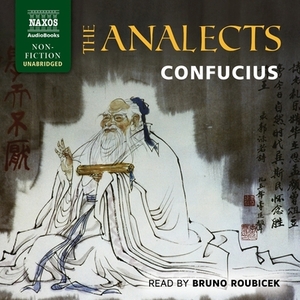Title: The Analects
Author: Confucius
Genre: Classic/Philosophy
Trigger Warnings: Death (mentions), animal death (mentions)
Back Cover:
One of the undisputed giants in the history of human thought, and the founder of one of the world’s longest-lasting cultural traditions, Confucius (known as Kong Fuzi in his native China) is arguably the most enduring of all the world’s great thinkers. The Analects, the slender volume thought to have been compiled by his followers, has the strongest claim to represent Confucius’ actual words. Sometimes pithy, sometimes conversational, occasionally enigmatic, often profoundly searching, the book contains memorable sayings about the moral health of the individual, the family and the body politic, and continues to be a source of inexhaustible wisdom after more than two and a half millennia.
Review:
This isn’t a review in the strictest sense. I’m just a white American twenty-something who reads too much – I don’t think I get to pass judgment on a book that’s been a cultural cornerstone for billions of people since the 300s BCE. However, I do have some thoughts on my experience of reading it, so that’s what this is.
Reading the Analects was a very similar experience to reading The Art of War – I could tell that this was full of great wisdom, but without context, a teacher, and many hours of study, all but the most obvious advice seemed beyond my grasp. However, this time I had the foresight to find a 12-hour lecture series about the Analects to listen to after reading the book. And I have to say, reading 2000+-year-old Eastern wisdom directly followed by listening to a professor of ancient Chinese history and philosophy explain it for 12 hours is the way to go. I’m tempted to reread The Art of War just so I can follow it up with a lecture series and comprehend it better.
Anyway. I frequently hear Confucianism classified as a religion, but after reading the Analects (and having a professor of ancient Chinese history and philosophy explain them to me), it’s an odd classification for a Western understanding of “religion.” Confucius as presented here isn’t concerned about deities or spirits or anything supernatural at all. The Analects is purely about how to live with the goal of becoming an “exemplary man” whose conduct is beyond reproach. This mostly involves filial piety (respect and subservience to parents, and to a lesser extent older siblings), dedicated and disciplined devotion to learning, and strict observance of ritual.
I have a hard time getting behind Confucian ideas of filial piety. I get respecting your parents, but I don’t get the eternal and complete submission to them that Confucius seems to be advocating, and I really don’t get letting older siblings have some control over your life by virtue of being older. I think I need more than 12 hours of lectures for my modern Western sensibilities to really grasp that one.
Devotion to learning, though, I can really get behind. Listening to hours and hours of content about how much Confucius valued learning and study made me want to go back to school and get a Master’s degree. I also appreciated his emphasis on the value of ritual. I’ve somehow gained even more appreciation for ritual since leaving religion and I appreciate the value that Confucius ascribes to it (which mainly seems to be community cohesiveness and respect for tradition).
There are a lot of things to appreciate in the Analects. They have great historical value, they give insight into politics and culture at the time they were written, they have influenced East Asia strongly for literally thousands of years, and much of their focus on right living is still applicable to the modern day. None of the individual sayings are particularly long, and they feel a bit like they’re intentionally bite-sized to make it easier to puzzle over each.
And there’s definitely plenty to puzzle over. Some sayings are easy to comprehend, others I would not have figured out without the lecture series explaining the historical and cultural context that gives it meaning. I recommend reading the Analects, but if you have the opportunity to read them and then have someone spend several hours explaining the intricacies to you, that’s the way to do it.

